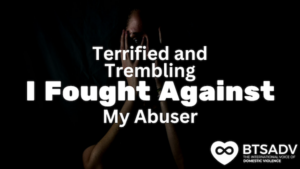You’ve barely slept all week. You decide to go to bed early to try to catch up on reset, but once in bed, you lay awake, your thoughts racing. You toss and turn, then decide to get up and grab a glass of water. The process repeats itself until finally, about three hours later, you fall asleep. Why is sleep so difficult?
Never Ending Pattern
A noise wakes you. Instantly your thoughts begin to race… what if he’s back? What if someone is in my house? Is this the end? “It’s okay,” you rationalize to yourself, “it was probably just the dog.” But even trying to talk yourself down keeps you up for at least another hour. You fall asleep again, only to wake up every hour, following the schedule your abuser kept you on. Most nights follow this pattern.
Do you relate to this?
Sleep and PTSD
If your answer is yes, you may have post-traumatic stress disorder. Aside from sleep disruptions, individuals suffering from PTSD are also likely to wake up screaming or thrashing, wake up often, move frequently during sleep, and have realistic nightmares which can lead to waking up in a state of panic. Being a victim of abuse has clear connections with sleep disruptions, some surveys suggest that 70 percent of people with PTSD experience insomnia and/or nightmares, according to Very Well Health.
Healthy Ways to Manage Sleep
There are healthy ways to manage sleep while struggling with PTSD. It’s important to not use alcohol or drugs as a coping mechanism as you can easily become dependent. Chemical dependency often leads to more disruptions of sleep, including sleep apnea. Lifestyle changes can help people with PTSD sleep more soundly. According to the National Sleep Foundation, referenced in Good Therapy, sleep is a habit and with the right changes, sleep patterns can be corrected.
Be patient with yourself. Change and healing take time.
You can follow these tips from Everyday Healthy, to help heal and reset those patterns:
- Adjust your bedtime (and be consistent),
- Avoid naps,
- Avoid oversleeping,
- Wake up a set time every day,
- Avoid exposure to blue light prior to going to bed,
- Exercise, but not too close to bedtime,
- Create and follow a personal bedtime routine that relaxes you,
- Use your bed only for sleeping, not to read or work.
Stress Management
Most importantly, managing stress levels can drastically reduce PTSD episodes. This relief can be found from therapy, meditation, yoga, or guided imagery. You can also consult with a doctor to determine if medication or other steps would help you have a more restful night of sleep.
Ultimately, do what makes you feel the safest and most comfortable. You know yourself best, follow all suggestions with good judgment of what will make you feel the happiest and healthiest.









